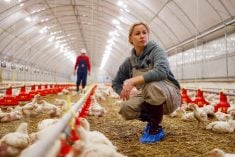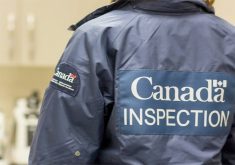The federal Conservative government is proposing tough new food safety legislation that gives inspectors new powers and sharply increases fines for food safety violations or food tampering.
The Safe Food for Canadians Act was introduced in the Senate June 7. Debate led by Manitoba Conservative Don Plett starts June 12.
The new legislation, not expected to make it into law before autumn or winter at the earliest, will consolidate four existing pieces of food inspection legislation and create consistent rules for inspection of all agricultural and seafood products — a system now covered by four laws with different rules.
Read Also

B.C. ostriches culled, CFIA confirms
Ostriches on an embattled Edgewood, B.C. farm have been culled after a prolonged legal battle, the Canadian Food Inspection Agency has confirmed.
The law will impose new record-keeping requirements on the food industry and give inspectors new powers to demand documents and to get warrants allowing access to premises.
In return, the food industry will have new ways to appeal Canadian Food Inspection Agency actions and decisions.
“Clearer, more consistent rules for our inspectors and industry will ultimately make food safer for Canadians,” agriculture minister Gerry Ritz said at an Ottawa news conference announcing the legislation.
The industry lobby Food and Consumer Products of Canada quickly endorsed the legislation.
“Canadians already enjoy some of the safest food products in the world. The proposed Safe Foods for Canadians Act will definitely further enhance Canada’s reputation as global food safety leaders,” president Nancy Croitoru said in a statement issued June 7. “Food & Consumer Products of Canada and all our members strongly support and applaud the federal government’s strong action to modernize Canada’s food safety laws.”
Bob Kingston, president of the Public Service Alliance of Canada Agriculture Union representing inspectors said the proposed changes are positive but CFIA does not have enough inspectors to give the law enforcement teeth.
“To make sure that all food safety systems are working properly to ensure the lowest risk to Canadians from the food we eat, the CFIA needs to double the inspection force,” he said.
New Democratic Party agriculture critic Malcolm Allen echoed that view.
He said food inspectors are actually losing their jobs through the current budget-cutting effort and a greater emphasis on having CFIA inspectors audit industry efforts rather than doing actual front-line food inspection is the wrong direction.
“This bill looks as if it’s going to privatize inspection services,” Allen told reporters. “So if CFIA inspectors are really going to be paper chasers and not real inspectors, that’s a concern.”
Ritz insisted that the government has hired more inspectors and not fewer. CFIA says inspector numbers are at record levels.
He said the legislation also will impose more product traceability responsibilities on the food company sector.
And the new law will sharply increase potential fines for companies that violate food safety rules or for people who tamper with or claim to have tampered with food, increasing potential fines to $5 million or more from $250,000 in existing legislation.
The government’s legislation is a response to a recommendation from Sheila Weatherill who held an investigation into the food system after a 2008 listeria outbreak that killed 22 Canadians.
She recommended new legislation to tighten controls and to consolidate and modernize an often-chaotic legislative and regulatory base.
Ritz said since then, the government has invested hundreds of million of dollars in food safety improvements and implemented all of her 57 recommendations.














